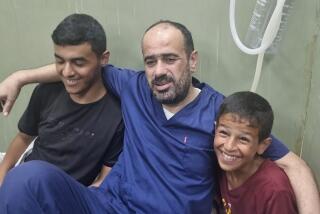Detainee refuses surgery
GUANTANAMO BAY, CUBA — A businessman being held for allegedly providing support to Al Qaeda has refused to have a heart operation at the U.S. military detention center hospital here and instead is seeking a court order for civilian treatment in the U.S. or his native Pakistan.
The dispute over who should operate and where has spotlighted questions of medical ethics in the handling of some of the 430 terrorism suspects detained at Guantanamo.
Saifullah Paracha, a 59-year-old real estate and media mogul who lived in the United States for 16 years, was to have undergone a cardiac catheterization this week to explore the cause of recurring chest pains and two previous heart attacks.
Guantanamo officials say that their 150-person medical team is capable of performing the routine operation and that nearly $400,000 was spent flying in a 24-member team of cardiac specialists and equipment to be on hand in case of complications.
But Paracha’s lawyers told a U.S. district judge in Washington last week that Guantanamo doctors had left him shackled during previous examinations and treatments. Paracha’s request for a court order to halt the operation at the prison was denied Monday, when Judge Paul L. Friedman said he was not convinced Paracha faced a risk of “irreparable injury” at Guantanamo.
Friedman said that government doctors operate on prisoners throughout the U.S. correctional system, but that he was troubled by the reports that Paracha was treated with his arms and legs restrained by metal shackles.
Cardiac catheterization is a diagnostic procedure that involves inserting a thin plastic tube into a vein or artery and threading it to the heart to locate any blockages and measure blood pressure, said Capt. Ronald Sollock, commander of the U.S. Naval Hospital here.
“We have absolutely all the expertise and equipment here to do the procedure, be it the catheterization or stent replacement or open-heart surgery,” Sollock said in an interview, reiterating the assertions he submitted to Friedman through the Justice Department last week. “We would never have suggested doing it here if we didn’t have every capability available.”
Sollock and Rear Adm. Harry B. Harris Jr., who commands the prison and interrogation network, said Paracha’s refusal to allow the surgery would be respected for now.
But, Harris said, he has a responsibility to keep the terrorism suspects in his custody alive to face war-crimes trials or testify against other prisoners. He and his predecessors in the command have previously authorized medical intervention to prevent suicides and halt hunger strikes.
The admiral said in an interview that he sees a clear ethical distinction between preventing self-inflicted harm and forcing a prisoner to have a surgical procedure he doesn’t want, even if it could prove to be lifesaving.
“Can we make a detainee or a patient undergo it?” Harris said. “Today the answer to that is no if the patient doesn’t want it.”
Physicians for Human Rights said that any operation forced on a detainee would be an ethical violation as recognized by the military medical community as well as the American Medical Assn.
“Medicine in the military is set up to ensure that a doctor does not have to take an order that goes against basic medical ethics,” said Nathaniel Raymond, a spokesman for the group.
And, Raymond said, military medical professionals at Guantanamo had “clearly violated” rules against force-feeding hunger strikers who are still conscious and capable of deciding for themselves whether to eat.
Paracha and his son are said to be key figures in the case against Majid Khan, one of 14 “high-value” detainees relocated here from secret CIA prisons in September.
Khan, according to U.S. authorities, allegedly researched poisoning U.S. reservoirs and was considered for an Al Qaeda plan to kill Pakistani President Pervez Musharraf. He was captured in 2003.
Paracha has said that he lived in the United States full time from 1971 to 1987, after which he visited frequently to oversee his businesses in New York, Chicago, Washington and San Francisco.
His son, Uzair Paracha, was arrested in the United States in May 2003 and charged with aiding an Al Qaeda operative who intended to bomb U.S. targets. He was sentenced to 30 years in prison earlier this year.
In a January 2005 hearing before a U.S. military panel in Guantanamo Bay, Saifullah Paracha recounted how he was arrested at the Bangkok airport in July 2003 while on a business trip and sent to Afghanistan -- where he was held until his transfer here 15 months later.
Paracha told the Combatant Status Review Tribunal that he had met Al Qaeda leader Osama bin Laden twice but described the encounters as news-gathering for Universal Broadcast Ltd., one of seven companies he owns.
He was informed at the tribunal that he is suspected of laundering money for Al Qaeda, plotting to smuggle explosives into the United States and recommending that nuclear weapons be used against U.S. soldiers.
Pakistan’s chief coordinator for human rights issues, Khawaja Khalid, told journalists in Islamabad last week that Paracha and Khan were in poor health and could die in detention if they didn’t receive treatment soon.
Paracha’s attorney, Gaillard T. Hunt, spoke with his client by telephone Tuesday and said that “he still thinks it is unsafe to go ahead [with the operation] at Guantanamo.”
Hunt said he was preparing to appeal Friedman’s ruling.
*
More to Read
Sign up for Essential California
The most important California stories and recommendations in your inbox every morning.
You may occasionally receive promotional content from the Los Angeles Times.











